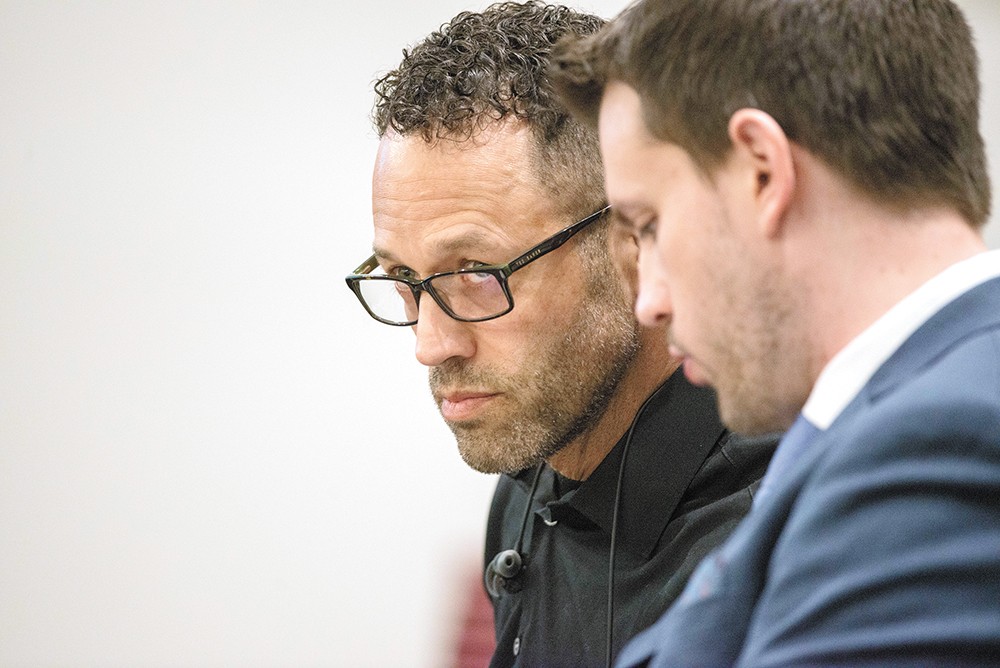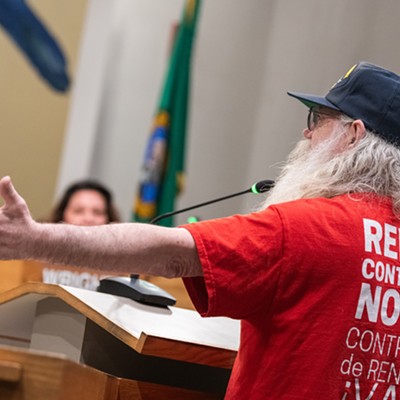
With his job and reputation on the line, city of Spokane recreation supervisor Adriano Eva stands before the civil service commission and shows them just why so many people have described him as charming and charismatic. His rousing testimony last month touches on his Brazilian heritage, his worldwide travels, his multilingual expertise, American values of fairness and the fundamental importance of forging personal relationships with his employees.
"I am your diversity," Eva says. "I don't think there's anybody in this building with nearly the vastness of the experience that I have in terms of interpersonal skills and building relationships."
Eva had been demoted and effectively fired after an HR investigation concluded that he'd violated the city's sexual harassment and general harassment policies. But last month, the civil service commission overruled the city, ordering Eva to be reinstated.
Among other accusations, the city said he'd peppered Conor Wigert, his temporary seasonal subordinate, with questions about Wigert's faith and sexual orientation. He told Wigert that he had "love in his heart for all people," but believed what the Bible said about homosexuality. He'd outed Wigert to another employee. He'd told him that, in Brazil, he knew a gay barber who gave haircuts to boys for sexual favors.
But Eva argued that he'd done nothing truly wrong. He was asking heartfelt questions, driven by a desire to understand his employees, he argued, and never had any reason to believe that anything he'd said or done was unwelcome.
"I have the courage to say, 'Please feel free to let me know if this uncomfortable to you at all,'" Eva testified. And they never had. He pointed to all his past assistants who'd attended the hearing and could attest to his integrity.
"Any of them could speak of my character, my motivation and my intent," Eva says.
But there's another story, one the civil service commission doesn't get to hear: This isn't the first time Eva has been accused of harassment.
In 2014, he'd been investigated for repeatedly subjecting a subordinate two decades younger than him to inappropriate comments and overtures. But Human Resources Director Chris Cavanaugh says the HR report was never officially submitted and so Eva was never officially disciplined. The lack of action handcuffed HR's ability to reference the case during last month's hearing, Cavanaugh says. The city believes it seriously screwed up.
"I wish we could go back to do it over," city spokeswoman Marlene Feist says. "It's painful for Chris, for me, for others."
The Inlander repeatedly offered Eva a chance to weigh in on the 2014 allegations. However, Eva's attorney, Marshall Casey, ultimately declined, arguing "they relate to Mr. Eva's marriage and family" and are irrelevant. Instead, Casey argues that human resources' "overly zealous prosecution" of Eva shows the HR department continues to be flawed.
FIRST REAL JOB
She was only 19. It was her first real job. Back in 2014, Shelby — who requested the Inlander not print her last name — was a temporary seasonal worker at Riverfront Park, first at the Carrousel, and then at the Ice Palace.
That was where she first met Eva. He was giggly as he asked her questions, she says. Despite being at least 23 years older than her, despite being married, he seemed to be flirting with her, she thought.
So she says she was almost relieved when, about a week later, he told her he wanted to offer her a temporary job as his secretary at his parks department office when she wasn't working for Riverfront Park.
"Oh, this guy wasn't flirting with me," Shelby recalls thinking, "He wants to work with me."
But those, it turned out, weren't mutually exclusive, according to the account she gave the city in 2014 and relayed to the Inlander. When she wore a blouse and skirt — having Googled "appropriate office attire" for her first office job — she says Eva told her she looked hot. On one occasion, she says, he asked her to touch his chest, to feel how fast she was making his heart beat. He told her he hadn't felt that way in a long time.
"To be honest, I totally had a crush on him," Shelby says now. He was nice. He was charming.
So when she learned the city wouldn't continue to let her moonlight for Eva, she says she was disappointed. But she'd also been feeling confused. She talked about her uncomfortable feelings with her mom, with her roommate and with her friends. Shelby later learned one of those friends, a police officer, contacted HR to warn them that Eva was subjecting Shelby to "inappropriate work behaviors."
But even after Shelby was removed from Eva's office, Shelby says that Eva's overtures didn't stop.
He brought her a cake to the Carrousel, telling her he'd Googled her and had found out that her dad had been a sheriff's deputy who died when she was 8. Shelby found it creepy.
He'd text her and he'd call. One moment, she says, he was inviting her out to lunch or coffee, telling her how attracted he was to her, describing intimate details about his marriage, and the next he was telling her they should stop all contact. But then, a day later, he'd start texting again.
It all culminated with an incident in his Riverfront Park office. Eva asked Shelby if she wanted him to kiss her. When she said she did, he locked the door.
The kiss was longer and more aggressive than she expected, she would later tell HR. She says he pushed her against the wall, groped her breasts. Shelby tells the Inlander she went home in tears. She says Eva called her the next day to say he'd confessed everything to his wife.
And then a few days later, on the evening of March 14, 2014, Shelby got a text message from Eva, from an account he stressed the city wouldn't be able to track, informing her that HR was investigating them. He passed along speculation that someone must have been "jealous" of them together and warns her that they "can't trust anyone."
The texts, obtained by the Inlander, show that Shelby was initially outraged by the investigation and argued they hadn't broken any city rules.
But Eva said that, because he was her older, male boss, the city wouldn't want to risk it: Shelby could sue the city five years later, he said, for not protecting her.
"The city policy is like that: 'Screw the man!'" Eva wrote. "Any lawyer would love to have your case. You can add a bit, make the story more dramatic and I'm doomed. Good thing I didn't touch you inappropriately."
Eva told Shelby that they needed to meet to come up with a "storyline that goes seamlessly together" to match the record of romantic text messages on his city cell phone. He proposes not telling anyone about the kiss. At first, Shelby agreed, but later insisted on telling the truth.
"I will not add to the immoral behavior," she wrote.
Eva assured her he planned to tell the full truth as well. But when Shelby refused to accompany him to speak with the city about the situation, he accused her in the texts of "going down a road that will make it harder for everyone" and that "someone has told you it is better that you play the victim."
She wasn't blameless, she texted, but she did feel like a bit of a victim.
"You were my superior and I was a lot younger than you," she wrote to Eva. "I never texted. I never asked to meet. I didn't compliment you on your looks constantly or look at you up and down the way you looked at me."
After speaking to HR, she wrestled with the stress, the guilt, the fear. Eva stopped contacting her, but from the outside, it seemed like little had been done — to him, anyway.
Shelby's roommate, Saarah El-Bakkush, got a job at Riverfront Park and had a front-row seat to hear all the gossip. She says she heard from supervisors that Shelby wasn't welcome to come back the next season.
"They considered her to be a 'trouble-maker' and 'promiscuous,'" El-Bakkush says. "They didn't want someone who caused problems to come back to the park."
UNFINISHED BUSINESS
For four years, the draft HR report on Eva sat in a file in City Hall. Cavanaugh, the HR director, says the city rediscovered the file last fall while investigating the more recent complaints against him.
In the report, authored by former HR analyst Dan Daling, Eva admits to kissing Shelby — though Eva portrays the kiss as gentler, briefer and without any inappropriate touching. But Daling ultimately finds Shelby to be more credible and less culpable than Eva.
To "ensure that these negative and disrespectful behaviors stop immediately," Daling urges for Eva to cease contact with Shelby, to never be placed in a supervisory role with her again, to be moved from Riverfront Park, and to be retrained on "respect in the workplace." Finally, he calls for Eva to be sent to a "predisciplinary hearing to determine what discipline, if any, is appropriate."
But Cavanuagh says that, from what the city can tell, that hearing never happened. The report isn't signed, and appeared like it had never been completed. Cavanaugh says she reacted with "shock and horror that we had not resolved it."
Cavanaugh says the parks department director at the time told her he was never sent the report. Today, Daling tells the Inlander that he'd submitted the draft to then-HR Director Heather Lowe — but he has no idea what she did with it.
For the past five years, the HR department has remained a turbulent place, wracked by internal strife. In 2016, Lowe left the city amid a scandal sparked by the firing of a police chief who'd been accused of sexual harassment. When Cavanaugh took over, she says, there was no master log of investigations. Cavanaugh says she can't find any of Daling's interview notes associated with his Eva investigation.
"It kind of makes me mad," says Daling, who Cavanaugh ousted in 2016. "Everything I did is in a file cabinet that was in front of Chris Cavanaugh's office."
Statutes of limitations mean it's too late to do anything about the 2014 harassment investigation. If the city had handled the investigation properly, Cavanaugh says, the city could have pointed to the discipline during last month's civil service hearing as proof Eva should have known his behavior was inappropriate.
"We would have been able to cite the case," she says. "We could have taken much more significant action."
Instead, the 2014 investigation was only alluded to briefly at the hearing, and Eva pointed to the lack of action as an effective exoneration.
"There was an issue that was brought up, it was investigated, and it was dropped, because there was no violation, I would assume," Eva said. "Apparently there was nothing there."
Eva claimed at the hearing that he'd been the one to report the issues to HR and his supervisors. And he said that his supervisors, his employees and HR had never directly told him — other than suggesting he was being too emphatic during meetings — that he'd stepped over the line or made anyone uncomfortable. Daling strongly disagrees: He says he was there at the meeting with Eva and his superiors, after which at least one action was taken.
"[Eva] was transferred to an office in City Hall," Daling recalls. "He was told to stay out of the park."
Casey, Eva's attorney, not only says that Shelby's case is legally irrelevant to the recent civil service hearing, he says that Eva's recent experience shows that "there are failures of HR, currently."
"Ms. Cavanaugh was driving the investigation that failed to ask key witnesses and failed to bring out key evidence," he tells the Inlander.
"Can you reasonably know a person doesn't want to discuss religion when they come and ask for prayer?"
tweet this
In one instance, the city charged that Eva should have known that discussing religion and playing gospel music was making Wigert, one of his employees, uncomfortable, especially after his supervisor raised concerns about the music. But the HR report hadn't mentioned the fact that Wigert had put on gospel music himself, nor the fact that Wigert had asked Eva for prayer.
"Can you reasonably know a person doesn't want to discuss religion when they come and ask for prayer?" Casey asked the civil service commission.
Eva said he hadn't been able to bring character witnesses. His perspective hadn't been included in the HR report. He had been effectively denied due process, he said.
"I came up against a bias from the very beginning," Eva said at the hearing.
GUILT AND POWER
After Eva's discipline was reversed by the civil service commission, he gave City Councilwoman Karen Stratton a big teary hug.
It was a painful thing to watch, she says. Eva's career and reputation had been damaged, she notes. "To me, nobody really won," Stratton says.
Today, the city is appealing the civil service verdict, and Eva will remain on paid leave until after it's completed.
Earlier this month, Wigert — the gay employee who Eva had been accused of harassing — and recreation supervisor Carissa Ware sat in a City Hall conference room, each dabbing away tears as they shared their stories. The civil service decision, Wigert says, felt "invalidating," like he'd been "silenced."
But he's also been feeling something else: guilt. He'd studied gender, race, sexuality and social justice in school, trained to be the sort of activist who would stand up for others. But he felt like he had failed to stand up for even himself. He hadn't told Eva directly that he was uncomfortable. He felt he'd bitten his tongue for the sake of his career.
And Ware, who'd ultimately reported Wigert's concerns to HR, was feeling guilty, too. As a lesbian, she'd experienced similarly uncomfortable conversations with Eva when he was her boss.
"I felt that, if I would have stepped up, Conor wouldn't have experienced the things he did," Ware says.
But speaking up was difficult. Ware and Wigert say that Eva repeatedly pushed for a personal relationship, demanded "loyalty" and "trust," and underscored how much he could help their careers. After Ware testified against him, Eva texted a co-worker that Ware had "betrayed" him.
From Eva's perspective, everything he'd done, he'd done with consent. He'd asked if they felt uncomfortable, and they'd always said no. But to Wigert, Ware and Shelby, that argument ignores the considerable power that Eva had over them, whether with authority, with age or with influence. It's a point Shelby had stressed to Eva five years ago, while they argued about whether their kiss was relevant.
"Last summer, two male employees kissed in front of the public at Merkel. Two boys, two gay boys. Nothing happened," Eva had texted her. "Why do we need to make a mess of it?"
"Was one the superior?" Shelby countered. "That's the difference." ♦

























